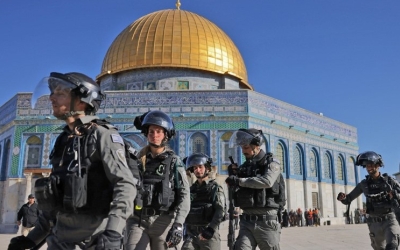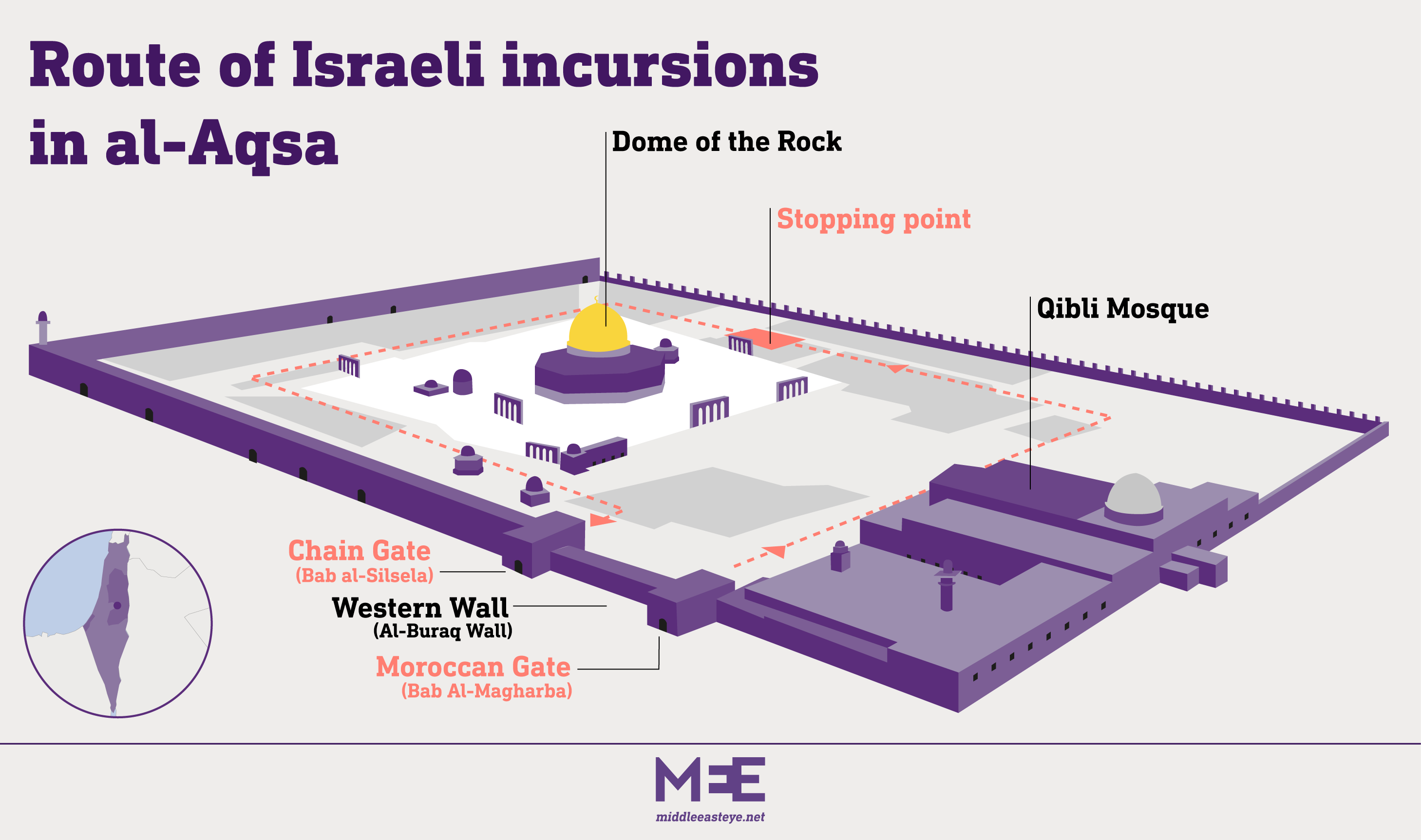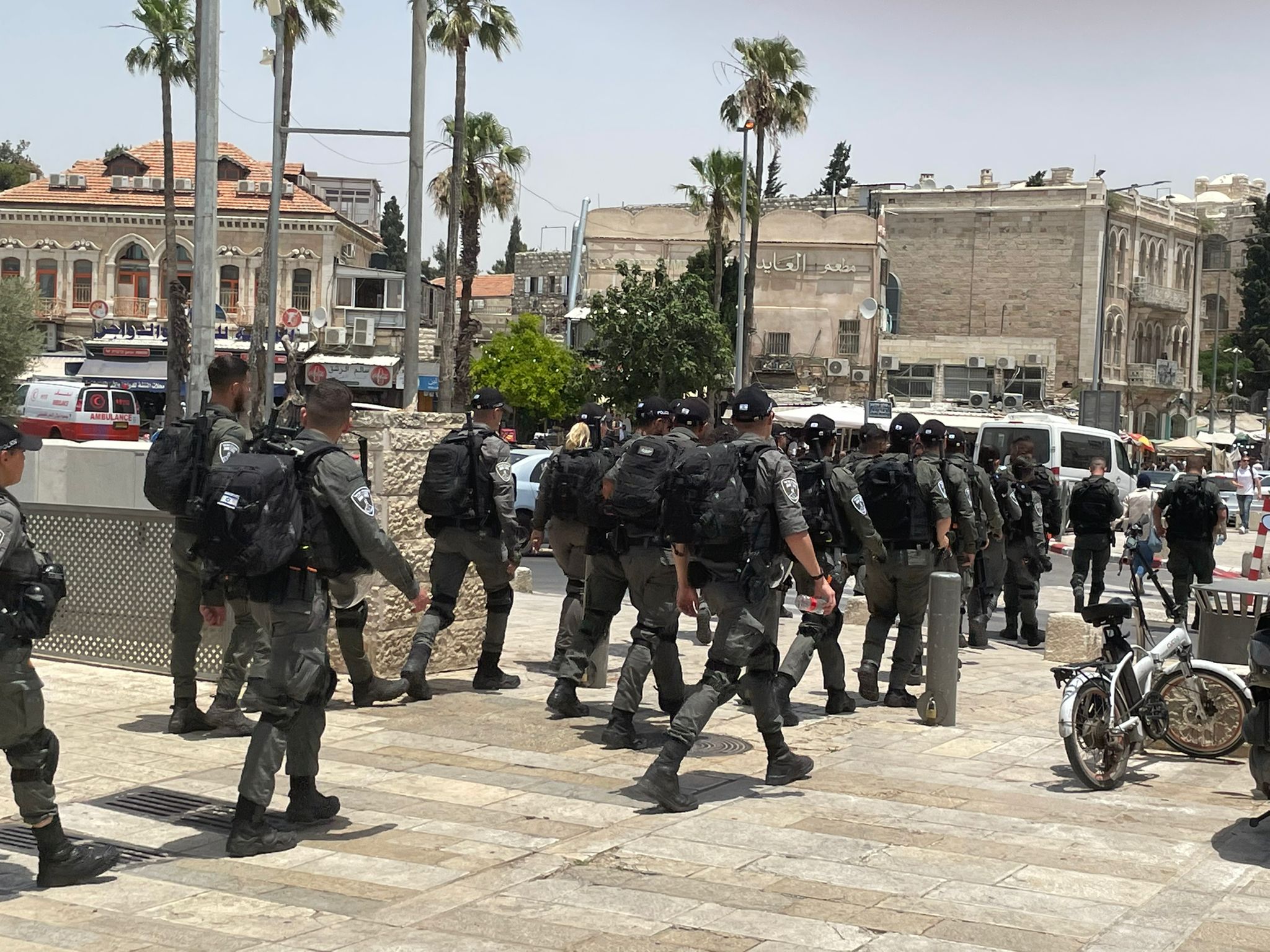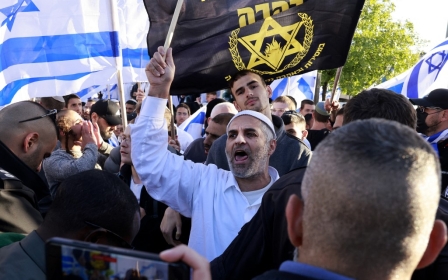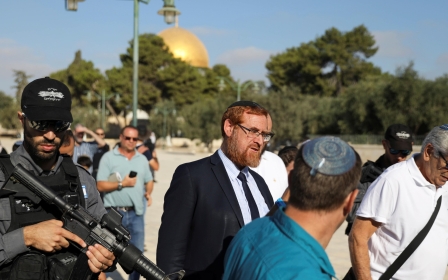Israeli flag raised in al-Aqsa Mosque storming ahead of far-right parade
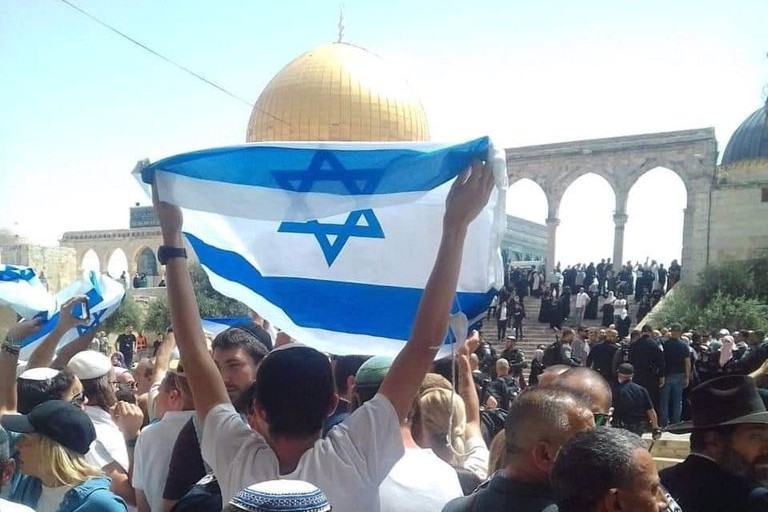
Hundreds of Israeli far-right activists and settlers stormed al-Aqsa Mosque on Sunday, performed group prayers and raised the Israeli flag ahead of a mass parade in occupied Jerusalem later in the day.
Palestinians in the mosque were assaulted by Israeli forces, who tried to empty the courtyards of Muslim worshippers to make way for the settlers.
Around 20 Palestinians had been arrested while at least 2,600 heavily protected settlers toured the courtyards of the mosque between 7am and 11am local time and later between 1:30pm and 2:30pm, according to Palestinian and Israeli reports.
"The scenes were painful to see," said Aida Saidawi, a Palestinian activist who lives metres away from al-Aqsa.
"The settlers can't enter on their own, they have to be protected by hundreds of police officers," she told Middle East Eye, adding that Palestinians were prevented from entering the mosque earlier in the day.
New MEE newsletter: Jerusalem Dispatch
Sign up to get the latest insights and analysis on Israel-Palestine, alongside Turkey Unpacked and other MEE newsletters
"We know al-Aqsa is only for Muslims, and we will not let go of it no matter the price. We will stay here, in our mosques, our streets, our homes."
Earlier, Israeli forces stopped Muslim worshippers from entering the mosque ahead of dawn and noon prayers. According to Palestinian sources, all men under the age of 50 were turned back, while some elders and women were also denied access.
During the five hours of incursions, some settlers were seen performing religious rituals and singing inside the courtyards of the mosque, which violates international agreements over the status quo in al-Aqsa, as well as Israeli bans.
They also raised the Israeli flag in groups for the first time in recent memory, without interference from the police.
Nabil Abu Rudeineh, a spokesperson for Palestinian Authority President Mahmoud Abbas, said Israel is "playing with fire" by allowing "settlers to desecrate holy sites".
Jordan's foreign ministry also denounced the raids and "demanded of Israel that it cease all practices and violations of al-Aqsa Mosque".
'Breach of international agreements'
Far-right lawmaker Itamar Ben-Gvir led one of the groups that stormed the mosque, in what Palestinians see as a provocation of their feelings and a desecration of the sanctity of the place, the third holiest site in Islam.
Ben-Gvir, who lives in an illegal settlement in the occupied West Bank, is the head of the small Jewish Power party and is associated with the hardline anti-Palestinian Kahanist ideology.
"Clearly there's an implicit order by police to allow [these violations] to pass," said Fakhri Abu Diab, the head of the Silwan Lands Defence Committee.
"This is a breach of international agreements... and also provokes the feelings of all Muslims."
As part of a decades-old understanding between Jordan – the custodian of Islamic and Christian sites in Jerusalem – and Israel, non-Muslims are not allowed to perform any religious rituals inside the confines of al-Aqsa Mosque, nor Israeli symbols are allowed to be displayed.
Non-Muslims can visit the mosque under the supervision of the Waqf, a joint Jordanian-Palestinian Islamic trust that manages the affairs of the mosque.
In 2003, the Waqf's management of al-Aqsa visits was rescinded by Israeli authorities. Since then, Israeli police have allowed settlers and far-right activists to storm the site on a near-daily basis.
In recent years, police have "quietly" been allowing settlers to perform Jewish prayer without publicising it.
Last week, Jerusalem's lower court ruled in favour of allowing Jewish prayer at al-Aqsa Mosque, a move that provoked heavy criticism from Palestinians.
The Magistrate's Court overturned a police restraining order against three Israeli far-right activists from praying at al-Aqsa Mosque, saying their prayer did not "raise worry of harm befalling national security, public safety or individual security".
The ruling was overturned by an Israeli appeals court on Wednesday.
Far-right march puts city on edge
The Aqsa raids only added fuel to tensions that have already been high in Jerusalem.
Later in the afternoon, thousands of Israelis will commence celebrations across Jerusalem to mark "Jerusalem Day," a holiday that commemorates the occupation of the city.
The events will include the notorious Flag March, a far-right parade associated with the violence against Palestinians and the "display of incitement, Jewish dominance, and racism," according to Israeli NGO Ir Amim.
Up to 16,000 ultra-nationalists are set to pass through the Muslim quarter of Jerusalem's Old City starting at 6pm local time, entering from Jaffa Gate and Damascus Gate, a well-known Palestinian monument.
Waving the Israeli flag while dancing and singing, marchers have in the past attacked Palestinian shops in the Old City and chanted anti-Muslim and anti-Palestinian slogans.
The march has the city on edge as Palestinians vow to counter it with a pro-Palestine demonstration and Israeli forces ramp up security across the city.
More than 3,000 officers have been deployed to guard the march. MEE saw dozens of metal barricades set up across the Old City, exceedingly impeding the movement of Palestinians.
Several units of heavily armed officers, including special forces, began arriving at Damascus Gate, which has been closed off.
Access to the plaza in front of the gate, which is one the main entrance leading to al-Aqsa, has also been restricted with barriers.
Meanwhile, flag-waving Israelis have started to congregate within and outside the walls of the Old City, leading to minor altercations with Palestinians.
In the city of Lydd, also known as Lod, which saw violent riots between Palestinian citizens of Israel and ultra-nationalist Israelis last year, more than 3,000 began a similar flag rally.
Flanked by police, crowds marched through the city and chanted anti-Palestinian slogans, according Palestinian news website Arab48.
Middle East Eye delivers independent and unrivalled coverage and analysis of the Middle East, North Africa and beyond. To learn more about republishing this content and the associated fees, please fill out this form. More about MEE can be found here.


